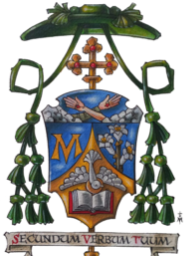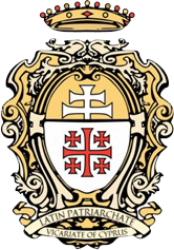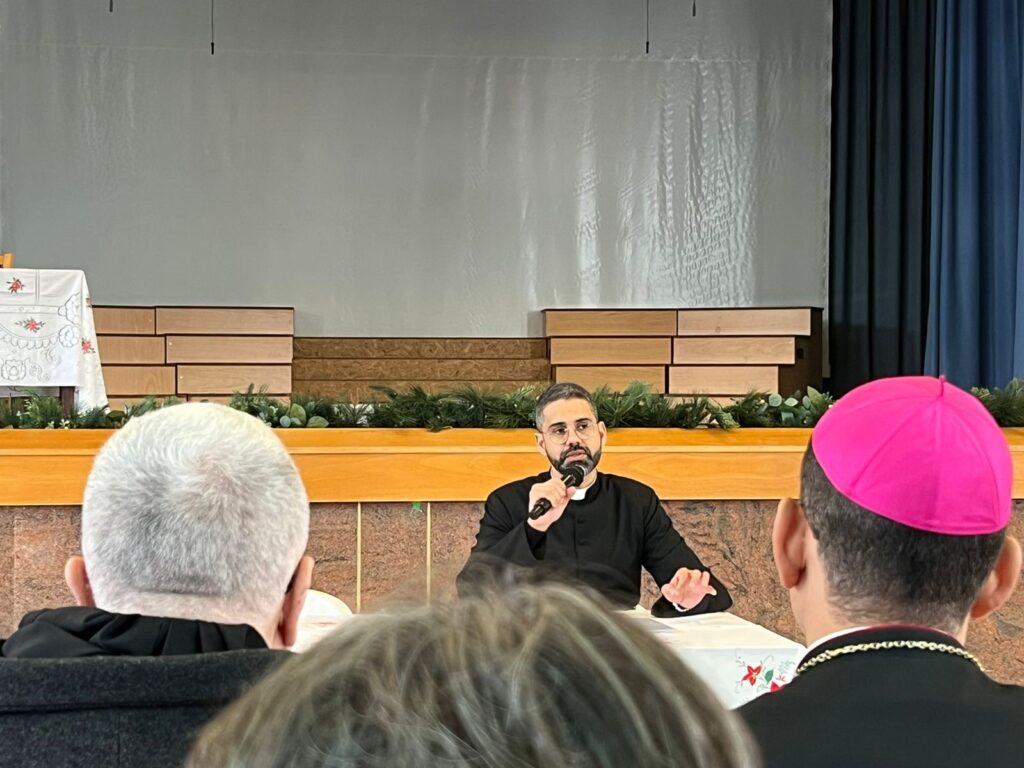Fr. Rogério Alves Gomes
“And all those who were of the faith were one in heart and soul”
It is with great joy that I am here with you today to share a little of my experience with the Word of God in the pastoral life of the Church in various places where the Lord has given me the opportunity to be. My name is Father Rogério, I come from Brazil as many of you already know, I’m 41 years old and I’ve been a priest for 15 years. The thing I’m most proud of in my curriculum vitae is being the son of a retired truck driver and an embroiderer of children’s clothes, because thanks to the principles and values they taught me, I can be here with you today.
As you can see, I don’t speak English very well, so I ask you to bear with me and if you don’t understand me, you can hold up your hands and feet and ask me to repeat it, because I have no problem with that.
I would like to invite you all at this time to open your bibles to Acts of the Apostles, 4:32. Today we will start from this verse to have a moment of encounter with God. Okay? Well, let’s just read verse thirty-two: “And all those who were of the faith were one in heart and soul”.
Let’s start with the first qualification of the faithful: What were they like? They were one. This “one” is very important, because it tells us that they were neither two nor three, but “one”. In other words, they were not divided. They had a unity, even though they were from different cultures, because at that time the Gospel had already spread beyond Israel. They were like us here today: diverse.
This “one” calls us to harmony. But what is harmony?
Harmony comes from the Greek ἁρμμονία, with the corresponding verb ἁρμόζω which means to compose, tune, adapt, have concord, structure, build, adjust, unite. This is a beautiful concept that the evangelist Luke used when referring to Christians!
In other words, he made clear to us a characteristic that concerns us today here in the Church of Cyprus: in order to have harmony we have to be one, and being one means adapting to this reality of the Church; fine-tuning our speech in order to evangelize; structuring a project so that we know where we want to go; building bridges of friendship, sincerity and collaboration so that people get to know us by the way we live; adjusting what is not right with frankness and truth, so that lies and gossip have no place in our lives and communities. All of this means this “one”.
Now let’s move on to what comes after “one”. The verse says: they were one heart. How beautiful! They didn’t stop at the simple numerical “one”. They had
something between them that connected them, which is the fruit of harmony, that is, melody, here in the biblical text represented by the heart.
Melody, the fruit of harmony, also comes from the Greek μελῳδέω which means to sing, to play a tune; a word made up of μέλος, which means member, person and ᾠδή which means song. In short, melody is a harmony of notes or people that together, in different tones, chords and measures, form the song and give rhythm to the words.
The heart is this melody that makes any pastoral project, any Church, any community pulsate; the heart is this melody that helps us overcome the cultural and existential barriers of where we are so that as one heart we can govern our lives and the lives of our Church and communities according to the Gospel, which is the heart of our lives and of all our evangelization.
We have to put all our heart into what we do, because everything we do, we do for the Lord Jesus Christ. Being aware that we have a heart is extremely important for our mission. But what do we mean by heart? The Holy Father, Pope Francis, in his latest encyclical “Dilexit nos”, which means “he loved us”, gives us a definition of the heart: The Holy Father says: In classical Greek, the word καρδία (kardía) denotes the inmost part of human beings, animals and plants. For Homer, it indicates not only the centre of the body, but also the human soul and spirit. In the Iliad, thoughts and feelings proceed from the heart and are closely bound one to another. The heart appears as the locus of desire and the place where important decisions take shape. In Plato, the heart serves, as it were, to unite the rational and instinctive aspects of the person, since the impulses of both the higher faculties and the passions were thought to pass through the veins that converge in the heart. From ancient times, then, there has been an appreciation of the fact that human beings are not simply a sum of different skills, but a unity of body and soul with a coordinating centre that provides a backdrop of meaning and direction to all that a person experiences. (Dilexit nos, 3)
Dear brothers and sisters, the heart is also the locus of sincerity, where deceit and disguise have no place. It usually indicates our true intentions, what we really think, believe and desire, the “secrets” that we tell no one: in a word, the naked truth about ourselves. It is the part of us that is neither appearance or illusion, but is instead authentic, real, entirely “who we are”. That is why Samson, who kept from Delilah the secret of his strength, was asked by her, “How can you say, ‘I love you’, when your heart is not with me?” (Judg 16:15). Only when Samson opened his heart to her, did she realize “that he had told her his whole secret” (Judg 16:18). (Dilexit nos, 5)
Dear brothers and sisters, the heart causes decisive questions to arise in our lives, such as: Who am I, really? What am I looking for? What direction do I want to give to my life, my decisions and my actions? Why and for what purpose am I in this world? How do I want to look back on my life once it ends? What meaning do I want to give
to all my experiences? Who do I want to be for others? Who am I for God? All these questions lead us back to the heart. (Dilexit nos, 8) All these questions define the kind of heart I have, the kind of consecrated person I am; they define how I make myself available to accept the new; to build the Church and announce the Kingdom with all the missionary ardor that drove the first Christians in harmony with my consecrated brothers, with my bishop, with my brother priests, with my Holy Father the Pope, with my parishioners. We must affirm that we have a heart and that our heart coexists with other hearts that help it to be a “you” (Dilexit nos, 12).
Dear brothers and sisters, the heart is also capable of unifying and harmonizing our personal history, which may seem hopelessly fragmented, yet is the place where everything can make sense. The Gospel tells us this in speaking of Our Lady, who saw things with the heart. She was able to dialogue with the things she experienced by pondering them in her heart, treasuring their memory and viewing them in a greater perspective. The best expression of how the heart thinks is found in the two passages in Saint Luke’s Gospel that speak to us of how Mary “treasured (synetérei) all these things and pondered (symbállousa) them in her heart” (cf. Lk 2:19 and 51). The Greek verb symbállein, “ponder”, evokes the image of putting two things together (“symbols”) in one’s mind and reflecting on them, in a dialogue with oneself. In Luke 2:51, the verb used is dietérei, which has the sense of “keep”. What Mary “kept” was not only her memory of what she had seen and heard, but also those aspects of it that she did not yet understand; these nonetheless remained present and alive in her memory, waiting to be “put together” in her heart. (Dilexit nos, 19).
Well, that’s it, let’s move on to the last part of our Bible verse: they were one in heart and one in soul.
What does one soul mean? It means to have life, to have a single breath, in other words, to walk breathing the desire to announce the Kingdom without lamentation, without putting up or creating difficulties for the people who come to us in search of hope, love and faith.
I say to you, dear brothers and sisters, that in my 15 years as a priest and more than 25 years of mission within the Church, I have been to the five continents of this world: sometimes teaching philosophy, sometimes giving catechesis, sometimes doing Bible schools, starting formation projects, sometimes giving courses to seminarians, consecrated, priests, sometimes advising pastoral courses, and what saddened me the most was when I found people, priests, consecrated sisters without a soul, that is, without life! How did I know they were soulless? By the way they reacted, because for people without a soul everything is difficult, everything is impossible; the priest, the sister, or the consecrated person without a soul only complain, they whine; people without a soul are negative, for them nothing will work out; people without a soul have
no enthusiasm, they no longer pray, they don’t smile; people without a soul have no sense of humor, they are grouchy; people without a soul are capable of turning a small problem into a storm!
On the contrary, the person, the priest, the sister, or the consecrated person who has a soul is always willing, doesn’t complain, everything becomes a possibility for proclaiming the Gospel; a person with a soul, smiles, has a sense of humor, looks for solutions to problems and never says: “that won’t work”. But always says: “let’s try, and if it doesn’t work, we’ll find another way”. Here we must ask ourselves a question: am I a person with a soul or without one?
Finally, dear brothers and sisters, the effectiveness of mission also presupposes that communities are united, that is, have “one heart and one soul” (cf. Acts 4:32), and are willing to witness to the love and joy that the Holy Spirit instills in the hearts of the faithful (cf. Acts 2:42). The Servant of God John Paul II had to write that before being action, the mission of the Church is witness and irradiation (cf. Enc. Redemptoris missio, 26). This was the case at the beginning of Christianity, when the pagans, writes Tertullian, were converted by seeing the love that reigned among Christians: “See,” they say, “how they love one another” (cf. Apologetics, 39 § 7).
May God help us in our lives, so that all of us here in Cyprus, who continue the mission of Barnabas and Paul, can be one heart and one soul in all the fullness of these words.


